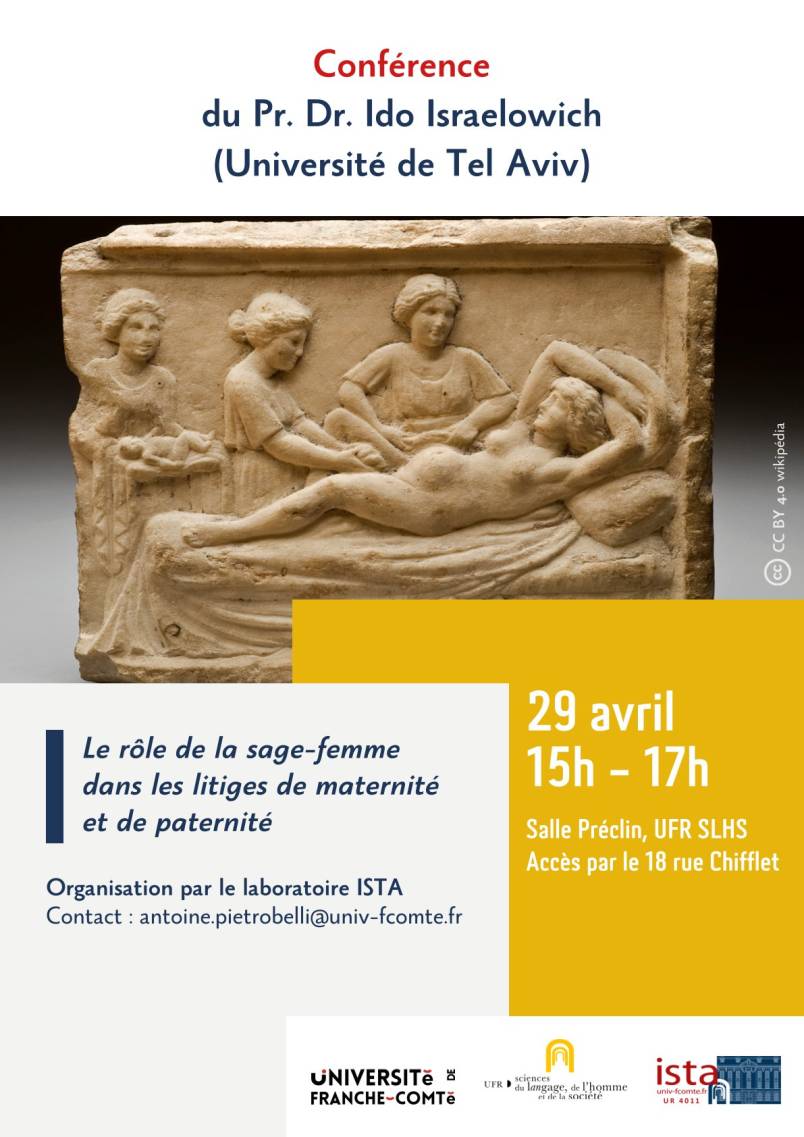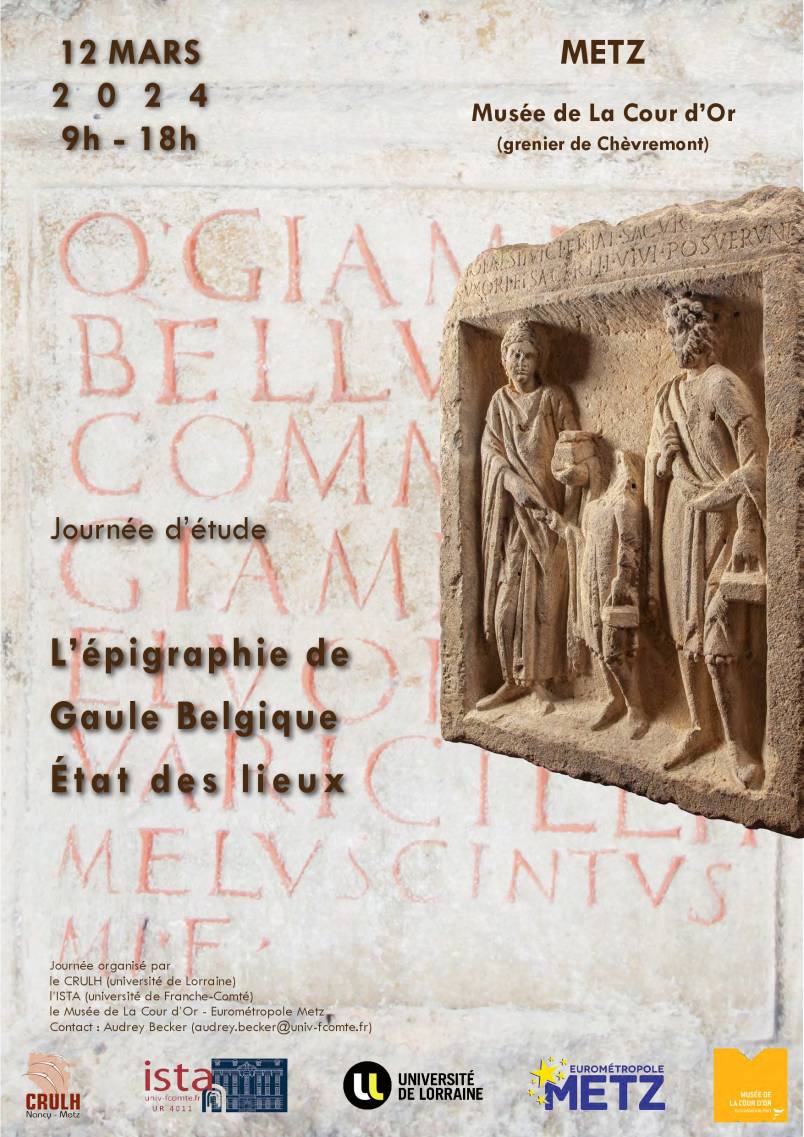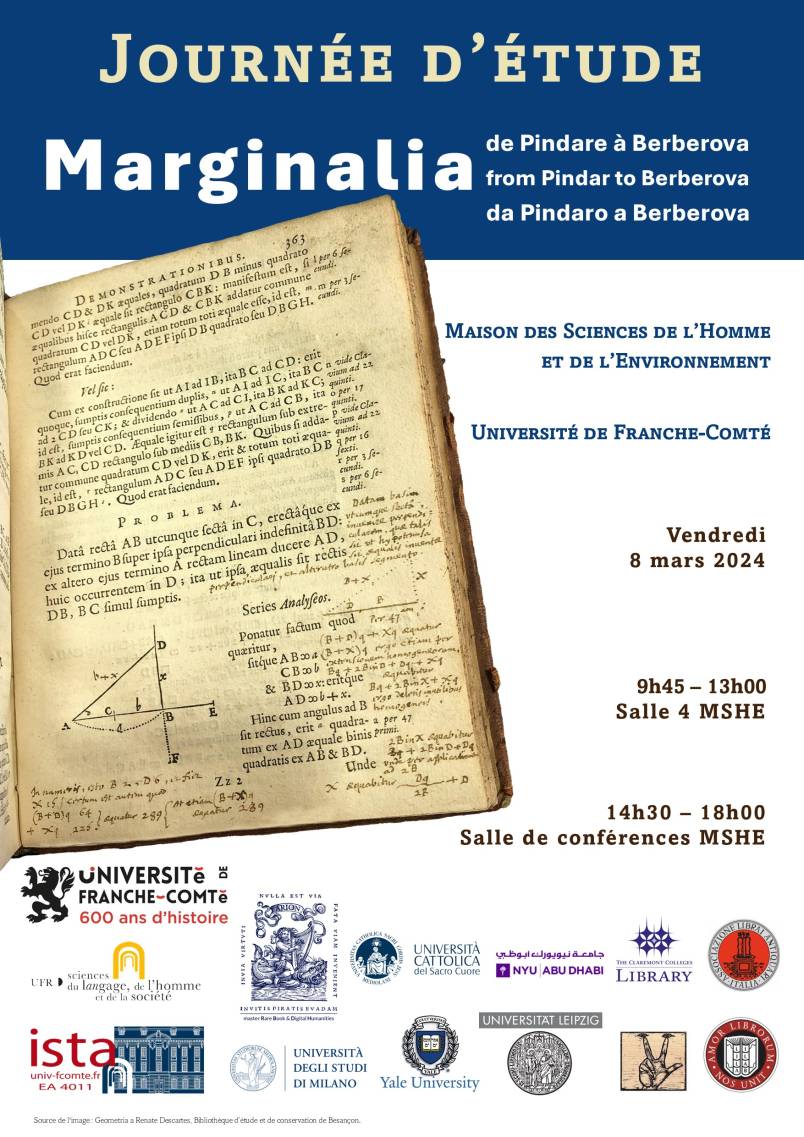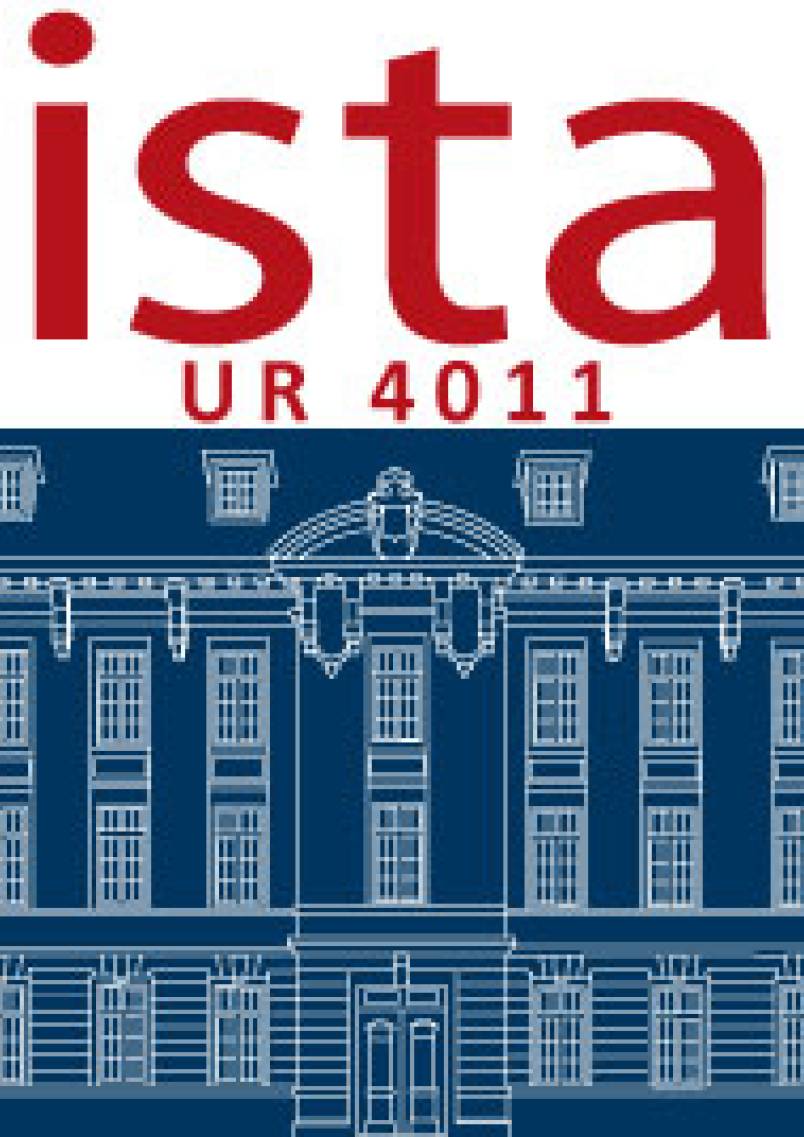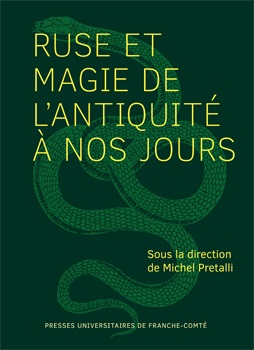Deprecated: pg_query(): Automatic fetching of PostgreSQL connection is deprecated in /var/www/ista/html/publista/Commun/dbHelper.php on line 204
Deprecated: pg_query(): Automatic fetching of PostgreSQL connection is deprecated in /var/www/ista/html/publista/Commun/dbHelper.php on line 268
Warning: Trying to access array offset on value of type bool in /var/www/ista/html/publista/Commun/dbHelper.php on line 282
Auteur :
Warning: Undefined property: stdClass::$prenom in /var/www/ista/html/publista/livre.php on line 83
Warning: Undefined property: stdClass::$nom in /var/www/ista/html/publista/livre.php on line 83
Deprecated: pg_query(): Automatic fetching of PostgreSQL connection is deprecated in /var/www/ista/html/publista/Commun/dbHelper.php on line 224
Langue : Français
PUFC
Michel PRETALLI
Tromperie et divertissement : deux récits sur la prestidigitation dans le monde romain
Anton ALVAR
La magie, un agent de la ruse chez les sorcières romaines : ou comment la fin justifie les moyens
Thomas GUARD
Des prestidigitateurs contre les saints : la bataille magique entre Saint Pierre et Simon le Mage
Massimo MANCA
Anelli e prigioni. Magia e inganno nel Lancelot propre
Giovanni ZAGNI
Écrire l’inganno. Nécromancie, sciomancie, géomancie dans la Divine Comédie
Alessandro BENUCCI
La Magie naturelle de della Porta entre secret, falsification et ruse
Alfonso PAOLELLA
Écrire des lettres sur le globe de la lune. Magie et ruse des miroirs de Corneille Agrippa à Jean-Baptiste Della Porta
Donato VERARDI
Les alchimistes faussaires entre Moyen Âge et Renaissance : ruse ou nécromancie ?
Alfredo PERIFANO
La magie est-elle le « Monde perdu » des psychologues ?
Cyril THOMAS, André DIDIERJEAN
Conclusion
Michel PRETALLI
La historia de la magia y la historia de l'engaño parecen transcurrir en paralelo: desde la antigüedad hasta la actualidad, los distintos capítulos del libro ponen de relieve algunos aspectos de los vínculos que han unido estos dos ricos y complejos objetos de estudio.
The history of magic and that of deception seem to proceed in parallel: from Antiquity to the present day, the various chapters of the book highlight certain aspects of the links that have united these two rich and complex objects of study
Deprecated: pg_query(): Automatic fetching of PostgreSQL connection is deprecated in /var/www/ista/html/publista/Commun/dbHelper.php on line 301
Deprecated: pg_query(): Automatic fetching of PostgreSQL connection is deprecated in /var/www/ista/html/publista/Commun/dbHelper.php on line 323
Auteur : Alessandro BENUCCIÉcrire l’inganno. Nécromancie, sciomancie, géomancie dans la Divine Comédie[Résumé]La sentence sans appel qui plonge les magiciens, les devins et autres sorciers dans les profondeurs de l’abîme infernal, et nous incite à voir en l’auteur de la Divine comédie un loyal défenseur de l’orthodoxie chrétienne, apparaît moins sévère lorsque Dante fait justement allusion à deux pratiques divinatoires – la nécromancie (plus exactement la sciomancie) dans Enfer, IX et la géomancie dans Purgatoire, XIX – en les associant étroitement au voyage de découverte – et au processus d’expiation – mené par le pèlerin de l’au-delà. Cet article propose de mettre en relation cette exception, que l’on pourrait qualifier à première vue comme hétérodoxe, avec la mise en scène (fictio) de la traversée de l’au-delà en tant qu’épistémologie du salut. Mesurés, ainsi, à l’aune des risques intellectuels qu’implique une entreprise surhumaine fondée sur le dépassement de soi et sur l’acquisition de connaissances normalement interdites, ces deux arts divinatoires en viennent à sous-tendre les fondements esthétiques d’une poésie de la transcendance. Les nécromanciens et les géomanciens se voient donc intégrés dans une stratégie de substitution littéraire dont Dante se sert pour exorciser ses craintes quant au bien- fondé de sa performance cognitive qu’il déploie tout au long de la Divine comédie. Mots-clés : Dante, Divine comédie, Enfer, Purgatoire, Divination, Moyen Âge, Poésie, Érichto. Writing the Inganno. Necromancy, Sciomancy, Geomancy in the Divine Comedy Abstract: The unambiguous sentence that plunges magicians, fortune tellers and other sorcerers into the depths of the infernal abyss, and encourages us to see the author of the Divine Comedy as a loyal defender of Christian orthodoxy, seems less severe when Dante refers to two divinatory practices: “necromancy” (or more precisely sciomancy) in Hell, IX, and “geomancy” in Purgatory, XIX by closely associating them with the journey of discovery – and the process of expiation – sought by the pilgrim to the afterlife. This article wants to relate this exception, which at first sight could be described as heterodox, to the dramatization (fictio) of the crossing of the afterlife as an epistemology of salvation. Measured, then, in the light of the intellectual risks involved in a superhuman enterprise based on surpassing oneself and acquiring knowledge normally forbidden, these two divinatory arts come to underpin the aesthetic foundations of a poetry of transcendence. Necromancers and geomancers are thus integrated into a strategy of literary substitution that Dante uses to exorcise his fears of the validity of his cognitive performance throughout the Divine Comedy. Keywords: Dante, Divine Comedy, Hell, Purgatory, Divination, Middle Ages, Poetry, Ericto.
Deprecated: pg_query(): Automatic fetching of PostgreSQL connection is deprecated in /var/www/ista/html/publista/Commun/dbHelper.php on line 323
Auteur : Donato VERARDIÉcrire des lettres sur le globe de la lune. Magie et ruse des miroirs de Corneille Agrippa à Jean-Baptiste Della Porta[Résumé]Cet article est consacré à la ruse et à la magie des miroirs dans la philosophie occulte de Cornelius Agrippa et dans la magie naturelle de Jean-Baptiste Della Porta. Le rôle de l’optique dans la magie naturelle des miroirs est examiné en relation avec la magie astrale et la théurgie des miroirs. L’article montre la mission philosophique sous-jacente à la magie d’Agrippa et Della Porta ainsi que leur opposition à la démonologie chrétienne. Mots-clés : Magie, Optique, Renaissance, Corneille Agrippa, Jean-Baptiste Della Porta. Inscribing Letters to the Lunar Globe. Magic and Deception of Mirrors from Cornelius Agrippa to Giambattista Della Porta Abstract: This article is devoted to the cunning and magic of mirrors in the occult philosophy of Cornelius Agrippa and in the natural magic of Giambattista Della Porta. The role of optics in the natural magic of mirrors is examined in relation to astral magic and the theurgy of mirrors. The article shows the philosophical mission of Agrippa and Della Porta’s magics and their opposition to Christian demonology. Keywords: Magic, Optics, Renaissance, Cornelius Agrippa, Giambattista Della Porta.
Deprecated: pg_query(): Automatic fetching of PostgreSQL connection is deprecated in /var/www/ista/html/publista/Commun/dbHelper.php on line 323
Auteur : Thomas GUARDLa magie, un agent de la ruse chez les sorcières romaines, ou comment la fin justifie les moyens[Résumé]À partir des définitions de la sorcière produites par Cicéron et Apulée, nous espérons mettre en évidence le rapport entre ruse et magie chez ce personnage conventionnel de la littérature latine. Nous constaterons que, si elle déborde d’ambition au point de vouloir plier le monde à sa volonté, la capacité de nuisance de la sorcière se trouve singulièrement limitée par sa petitesse. Ce décalage contribue à en faire un personnage burlesque, traité par la dérision. Sort du lot l’archétype de la sorcière, Médée, personnage dont la nature tragique fait craindre des pouvoirs sans limites, d’autant plus funestes qu’ils sont associés à la ruse : c’est dans le caractère dissimulateur de Médée que s’exprime au mieux le lien profond qui unit la magie et la ruse. Mots-clés : Magus, saga, dolus, fraus, machinatrix, Médée, Canidie, Méroé, Pamphilé. Roman Witches: from Cunning to Magic Abstract: From the definitions of the witch written by Cicero and Apuleius, we hope to highlight the relationship between cunning and magic in this conventional character of Latin literature. We will verify that, while she wants to submit the world to her will, with ambition, the witch’s capacity for harm is really limited by her meanness. However, the witch Medea is a character whose tragic nature means limitless powers, which are more fatal as they are associated with cunning: Medea’s concealment means the bond which connects magic and cunning. Keywords: Magus, saga, dolus, fraus, machinatrix, Medea, Canidia, Meroe, Pamphile.
Deprecated: pg_query(): Automatic fetching of PostgreSQL connection is deprecated in /var/www/ista/html/publista/Commun/dbHelper.php on line 323
Auteur : Massimo MANCADes prestidigitateurs contre les saints : la bataille magique entre Saint Pierre et Simon le Mage[Résumé]Cette contribution se propose d’analyser la figure de Simon le Mage en tant que magicien, en essayant de définir ce que l’on entend exactement dans ce cas par « magicien » : être doté de pouvoirs réels ou simple charlatan ? C’est la légitimité même de cette distinction qui est discutée : la figure du prestidigitateur et celle du sorcier ne se distinguent, et jamais complètement, qu’à partir de l’entrée du prestige dans les théâtres, au xixe siècle. Les Anciens faisaient beaucoup plus confiance à la suspension de l’incrédulité. Le mélange entre « magicien » et « sorcier » est déjà dans la Bible. Dans le duel magique entre Pierre et Simon se pose un problème de théodicée : de qui viennent les pouvoirs du magicien ? La tradition a apporté diverses réponses : de personne (thèse du magicien) ou d’une force du mal (thèse du sorcier noir), jusqu’à l’identification de Simon avec l’Antéchrist et son association avec l’empereur Néron. Mots-clés : Magie, Simon Magus, Saint Pierre, Vérité, Sorcellerie. Wizards Against Saints: The Magic Duel Between Saint Peter and Simon Magus Abstract: This article analyzes the figure of Simon Magus as a magician, trying to define what is meant in this case by “magician”: a person endowed with real powers or a simple charlatan? The legitimacy itself of this distinction is discussed: the figure of the wizard and that of the magician are shared apart, and never completely, only starting from the entrance of prestige in theaters, in the 19th century. The ancients relied much more on the suspension of disbelief. The mixture between “wizard” and “magician” already exists in the Bible. In the magical duel between Peter and Simon a problem of theodicy arises: from whom do the possible powers of the magician come? Tradition has given various answers: from no one (thesis of the magician) or from a force of evil (thesis of the black wizard), up to the identification of Simon with the antichrist and his association with the emperor Nero. Keywords: Magic, Simon Magus, Saint Peter, Truth, Witchcraft.
Deprecated: pg_query(): Automatic fetching of PostgreSQL connection is deprecated in /var/www/ista/html/publista/Commun/dbHelper.php on line 323
Auteur : Alfonso PAOLELLALa Magie naturelle de Della Porta, entre secret, falsification et ruse[Résumé]À travers le carré logico-sémiotique de la modalité véridictoire développé par Greimas, cet article analyse comment Della Porta tente de ramener à la science ce qui relevait de l’occulte : c’est-à-dire que les « miracles » de la nature peuvent être expliqués selon des lois naturelles. Sont examinées seulement les techniques de transmutation des métaux, la falsification de bijoux et la construction de différentes formes de langage caché. Della Porta utilise le dévoilement de la ruse, de la falsification et du secret pour faire ressortir la vérité « naturelle ». Mais sa révolution n’est pas radicale car il a une vision de la science toujours liée à la cosmologie médiévale. Mots-clés : Della Porta, Magie Naturelle, Modalités logiques, Secret, Falsification, Ruse. The Natural Magic of Della Porta, between Secrecy, Falsification and Cunning Abstract: Through the logico-semiotic square of the veridictory modality developed by Greimas, we analyze how della Porta tries to bring back to science what came under the occult: that is to say that the “miracles” of nature can be explained according to natural laws. We only examine the techniques of transmutation of metals, the forgery of jewelry and the construction of different forms of hidden language. Della Porta uses the exposure of cunning, forgery and secrecy to bring out the “natural” truth. But his revolution is not radical because he has a vision of science always linked to medieval cosmology. Keywords:Della Porta, Natural Magic, Logical Modalities, Secret, Falsification, Cunning.
Deprecated: pg_query(): Automatic fetching of PostgreSQL connection is deprecated in /var/www/ista/html/publista/Commun/dbHelper.php on line 323
Auteur : Alfredo PERIFANOLes alchimistes faussaires entre Moyen Âge et Renaissance : ruse ou nécromancie ?[Résumé]Les textes alchimiques occidentaux des xii-xvie siècle affirment l’opposition entre les vrais philosophes – qui pratiquaient la vraie alchimie qui transmute les métaux in substantia – et les faussaires ou sophistes qui ne faisaient que les teindre en surface. Ces derniers sont de véritables aigrefins qui grâce à leur expertise, à leur ruse et à l’avidité de leurs interlocuteurs réalisaient leurs méfaits par une opération frauduleuse dont le résultat avait toutes les caractéristiques du vrai : ils faisaient croire qu’ils étaient en mesure d’appliquer l’appareil doctrinal de l’alchimie des philosophes bâti sur une théorie de la matière permettant la vraie transmutation. En relevant certains aspects du débat de l’époque sur cette théorie éminemment épistémologique, nous nous proposons de faire ressortir les modalités de ces procédés intellectuels grâce auxquels la ruse et/ ou la nécromancie opéraient. Mots-clés : Moyen Âge, Renaissance, Alchimie, Faussaires, Ruse, Nécromancie. The Alchemists and Forgers between the Middle Ages and the Renaissance: Deception or Necromancy? Abstract: The occidental texts of alchemy of the 12-16th centuries assert the opposition between the true philosophers – who transmute metals in substantia – and the forgers (or sophists) who only colored them superficially. The latter are swindlers who, thanks to their expertise, their cunning and the avidity of their interlocutors, committed their misdemeanors through a fraudulent operation the result of which had all the appearances of truthfulness: they led people to believe they were able to apply the doctrinal appatus of the alchemy of the philosophers, built upon a theory of matter which allowed true transmutation. Concentrating on particular aspects of the debate of the time about this highly epistemological theory, this paper aims at highlighting the mechanisms of those intellectual processes thanks to which deception and/or necromancy operated. Keywords: Middle Ages, Renaissance, Alchemy, Forgers, Deception, Necromancy.
Deprecated: pg_query(): Automatic fetching of PostgreSQL connection is deprecated in /var/www/ista/html/publista/Commun/dbHelper.php on line 323
Auteur : Giovanni ZAGNIAnelli e prigioni. Magia e inganno nel Lancelot propre[Résumé]Nel romanzo arturiano del Lancelot propre si riflette la varietà dei fenomeni magici nell’universo culturale medievale, dove diverse categorie di magia venivano associate ai molti differenti poteri riconosciuti in grado di influire sulle vicende umane: dai poteri occulti della natura alle forze divine e diaboliche. La magia nel romanzo si intreccia con l’inganno sia a livello profondo, giacché molti incantesimi sono interpretati come sviamento dei sensi, sia in molti episodi in cui le forze soprannaturali sono piegate a servire gli interessi dei personaggi, tanto positivi quanto negativi. Parole chiave: Lancelot, Romanzi arturiani, Magia, Inganno, Fate. Anneaux et prisons. Magie et tromperie dans le Lancelot propre Résumé : Le roman arthurien du Lancelot propre reflète la variété des phénomènes magiques dans l’univers culturel médiéval, où différentes catégories de magie étaient associées aux nombreux pouvoirs reconnus comme capables d’influencer les affaires humaines : des pouvoirs occultes de la nature aux forces divines et diaboliques. Dans le roman, la magie est entrelacée avec la tromperie, à la fois à un niveau profond, puisque de nombreux sorts sont interprétés comme un détournement des sens, et dans de nombreux épisodes où les forces surnaturelles sont détournées pour servir les intérêts des personnages, tant positifs que négatifs. Mot-clés : Lancelot, Romans arthuriens, Magie, Ruse, Fées. Rings and Prisons. Magic and Deception in the Lancelot propre Abstract: The Arthurian romance Lancelot propre mirrors the variety of magical phenomena in the Medieval cultural universe, where different categories of magic are associated to different powers deemed able to influence human endeavours: from occult powers in nature to divine and demonic forces. Magic in the romance is deeply linked with deception, since many enchantments are normally interpreted as deceits of the physical senses, and at the same time supernatural forces are used to serve both positive and negative characters’ interests in many episodes along the narrative. Keywords: Lancelot, Arthurian Romances, Magic, Ruse, Fairies.
Deprecated: pg_query(): Automatic fetching of PostgreSQL connection is deprecated in /var/www/ista/html/publista/Commun/dbHelper.php on line 323
Auteurs : Cyril THOMAS, André DIDIERJEANLa magie est-elle le « Monde perdu » des psychologues ?[Résumé]Dans Le monde perdu, ouvrage de Conan Doyle publié en 1912, une expédition découvre en Amérique du Sud une zone coupée du reste du monde qui abrite de très nombreuses espèces inconnues, héritières directes des dinosaures. Existe-il pour les chercheurs en psychologie un terrain d’étude qui permettrait de découvrir chez l’humain des processus mentaux inconnus ? Dans ce chapitre nous défendons l’idée que la prestidigitation pourrait être le « Monde perdu » des chercheurs en sciences cognitives. En attendant d’y découvrir peut-être un jour des mécanismes mentaux inconnus, ce domaine offre un terrain fertile pour étudier de nombreux processus cognitifs. Mots-clés : Psychologie cognitive, Magie, Détournement d’attention, Anticipation perceptive, Faux souvenirs. Is Magic the “Lost World” for Psychologists? Summary: In The Lost World, a book by Conan Doyle published in 1912, an expedition discovered in south America a place where prehistoric animals, dinosaurs and other extinct creatures, still survive. In this chapter we argue that, very much like the expedition discovering new species in Conan Doyle’s book, magic should enable researchers in cognitive sciences to unravel new psychological processes that have been most often ignored so far. Until the discovery of unknown cognitive processes, we argue that this domain offers an original ground for studying cognitive processes. Keywords: Cognitive Psychology, Magic, Misdirection, Perceptive Anticipation, False Memory.
Deprecated: pg_query(): Automatic fetching of PostgreSQL connection is deprecated in /var/www/ista/html/publista/Commun/dbHelper.php on line 323
Auteur : Antón ALVAR NUÑOTromperie et divertissement : deux récits sur la prestidigitation dans le monde romain[Résumé]L’objectif de mon intervention est de montrer deux types des récits liés à la description des tours de prestidigitation. Le premier récit est le portrait fait par Diodore de Sicile du leader de la première révolte servile à Rome, l’esclave d’origine syrienne Eunous. Pour démontrer comment Eunous use d’un artifice pour essayer de convaincre son public de ses pouvoirs surhumains, Diodore explique en détail le subterfuge qu’il utilisait pour cracher du feu. Le deuxième récit que je propose provient d’un papyrus qui contient une série d’instructions pour réaliser des tours de magie à table. Si dans le récit de Diodore le but de la description du dispositif dont Eunous se sert est de démontrer qu’il est un imposteur, les « recettes » du papyrus ont pour but d’exposer toute une série de possibilités telles que le divertissement des invités dans les banquets, démontrer d’une manière attirante et anecdotique l’érudition de l’hôte du banquet et ses connaissances en sciences naturelles ou, comme Diodore en témoigne, questionner l’autorité religieuse de certains individus. Mots-clés : Eunous, Paignia, Diodore de Sicile, Banquets, Prestidigitation, Magie. Trickery and Entertainment: Two Accounts About Prestidigitation in the Roman World Abstract: The purpose of this paper is to analyse two different narratives related to the description of magic tricks. The first narrative is the portrait of the first Sicilian Slave Revolt leader, Eunus, according to Diodorus Siculus. In order to show how Eunus was a scam, Diodore describes with all sort of details the device (gimmick) that Eunus allegedly used to spit fire. The second narrative I analyse is a compilation of “magical” recipes preserved in a graeco-egyptian papyrus intended to be performed in banquets. If Diodorus narrative related to the description of how magic tricks is aimed at unveiling Eunus fraud, the papyrus’ recipes unfold a whole range of discursive possibilities, including pure joy, the banquet host’s pedantry in relation to natural sciences or, in the line of Diodorus, questioning the religious authority of certain individuals. Keywords: Eunus, Paignia, Diodorus Siculus, Banquets, Prestidigitation, Magic.

